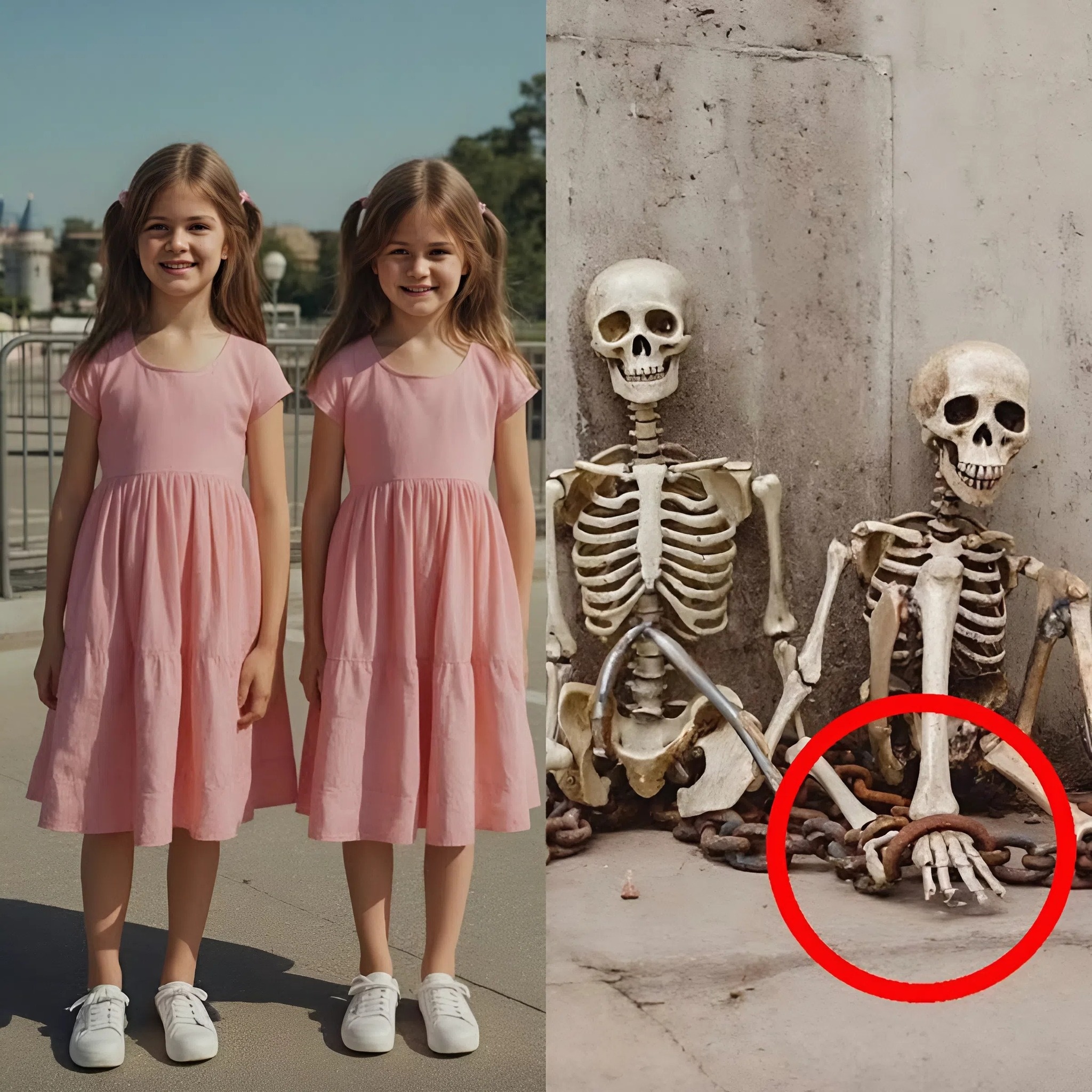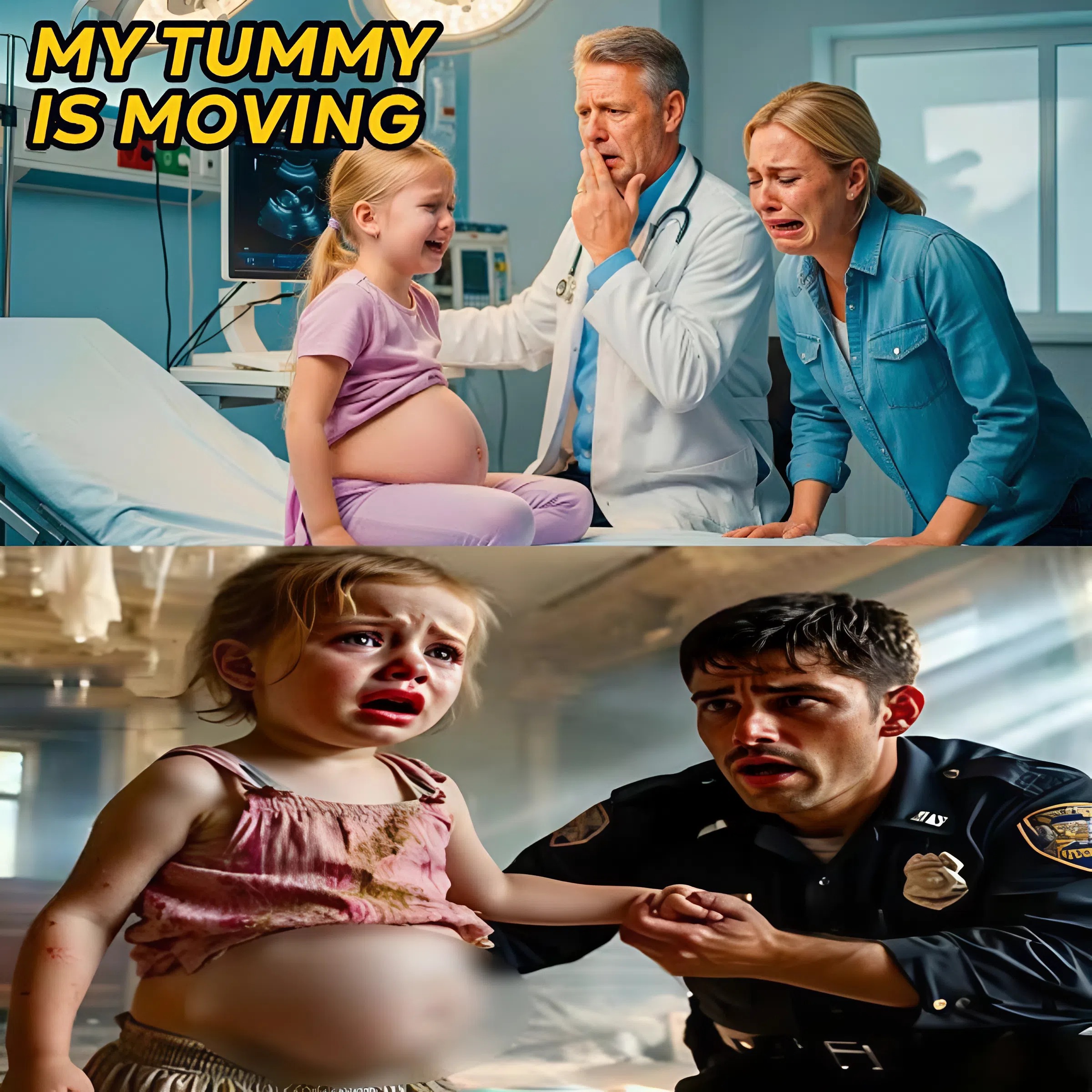“Mommy, It Hurts” — The Night That Changed Everything
The rain had been steady that Sunday evening, the kind that tapped gently on windows but carried a chill underneath. St. Mary’s Hospital was unusually quiet, its long white hallways glowing under fluorescent lights. Rebecca Anderson sat in the pediatric emergency wing, clutching her daughter’s small backpack in her lap. The zipper was broken. Her hands wouldn’t stop shaking.
Inside the examination room, eight-year-old Lila lay curled on a bed, her small frame trembling beneath a blanket that seemed far too big for her. Dr. Emily Hayes, calm and soft-spoken, adjusted the ultrasound monitor and tried to hide the worry rising in her chest. She had seen bruises before — children fall, they stumble, they play rough. But these bruises weren’t like that. They were patterned, deliberate.
“Sweetheart,” she said gently, brushing a strand of hair from Lila’s forehead, “can you tell me what happened?”
Lila’s lips quivered. Her eyes darted to the door. “It hurts,” she whispered again, her voice breaking.
Rebecca stepped closer, trying to steady her voice. “Honey, you can tell the doctor. Did you fall?”
Lila shook her head, tears rolling down her cheeks. “I don’t want to go back,” she whispered, so faintly that Dr. Hayes almost missed it.
Go back where? The words echoed like a cold wind through the room.
When the doctor turned to the monitor, she froze. Her breath caught. The ultrasound revealed internal injuries no fall could cause — injuries that screamed of violence, of cruelty. She swallowed hard, forcing her voice to stay even. “Mrs. Anderson,” she said, stepping into the hallway. “I’m so sorry, but… these injuries are consistent with something very serious. This wasn’t an accident.”
Rebecca’s knees went weak. “What do you mean?” she stammered. “What happened to my baby?”
Dr. Hayes hesitated, her professional composure cracking. “Mrs. Anderson,” she said quietly, “I have to call the police.”

The phone call was short, procedural, but it felt like the walls themselves were closing in. Within fifteen minutes, two officers arrived — one male, one female — their uniforms soaked from the rain outside. The woman, Officer Dana Brooks, approached Rebecca with measured calm. “Ma’am, I know this is hard, but we need to speak with Lila privately. We just want to help her.”
Rebecca’s instinct was to refuse. She wanted to hold her daughter, to protect her from every stare, every question. But she saw the steady kindness in Officer Brooks’s eyes and nodded. “Please… just be gentle,” she whispered.
Behind the closed door, the child spoke in halting words. The air was thick with silence. Every few seconds, muffled sobs broke through, and Rebecca pressed her fist to her mouth to keep from screaming.
When the officers emerged, they didn’t have to say anything. Their faces said it all.
Tom.
Her ex-husband.
The man who had once brought her flowers every Sunday. The man who had convinced the court that he loved Lila, that weekends with him were “good for her.”
Rebecca’s memories collided like broken glass — the first time Lila had cried and begged not to go; the bruises she had dismissed as “playground scrapes”; the way Tom’s smile never reached his eyes anymore.
For months, Rebecca had fought to keep peace, to believe in decency. But decency had betrayed her.
As she sat in the waiting room, her breath coming in sharp gasps, she could hear her daughter’s soft voice from the other side of the wall. “He said I couldn’t tell,” Lila whispered. “He said Mommy would hate me.”
Rebecca broke. Her body convulsed with sobs, each one sharper than the last. The nurse tried to comfort her, but nothing could reach through that kind of pain — the kind that comes not from what someone did to you, but what they did to your child while you didn’t see.
By midnight, the hospital was a flurry of quiet activity. Police statements, medical reports, photographs — the cold machinery of justice grinding into motion. Dr. Hayes stayed long after her shift ended, watching through the glass as Lila was transferred to the pediatric trauma ward. The little girl’s face was pale, her eyes empty.
Rebecca walked beside the gurney, her hand on her daughter’s hair. “I’m here, baby,” she kept saying. “I’m here now.”
But deep down, she couldn’t shake the question that clawed at her: Where was I before?

When the detectives arrived the next morning, the world outside was bright again — indifferent, almost cruel in its normalcy. Birds chirped over the hospital parking lot. Coffee steamed in paper cups. Life moved on, as if nothing had shattered.
Detective Morales took Rebecca’s statement. He was patient but precise. “Mrs. Anderson, when did you first notice your daughter was uncomfortable visiting your ex-husband?”
Rebecca’s hands twisted in her lap. “A few months ago. She’d cry when it was time to go. I thought… I thought she was just adjusting. He was so convincing — he said she was just emotional.”
The detective nodded slowly. “Abusers are often very good at convincing people they’re safe.”
The words hit her like a slap. She stared at the table, tears forming again. “I thought I was protecting her by keeping peace with him.”
“Ma’am,” the detective said softly, “you’re protecting her now.”
That night, Rebecca didn’t go home. She stayed in the hospital room, watching the steady rise and fall of Lila’s chest as machines hummed quietly. The little girl clutched a small stuffed rabbit, its ears worn from years of love.
Dr. Hayes came by again, exhaustion on her face but a softness in her eyes. “She’s going to need therapy,” she said gently. “But she’s strong. You both are.”
Rebecca nodded. “She was always stronger than me.”
“Maybe,” the doctor said, “but tonight, she knows you believe her. That makes all the difference.”
For a long moment, they stood in silence. Outside, the storm had passed. The world was still, washed clean.
In the weeks that followed, the case made headlines. Reporters camped outside the courthouse; neighbors whispered in shock. Tom was arrested and charged with multiple counts of child sexual assault. Rebecca didn’t attend the first hearing — she couldn’t bear to see his face. But when the trial began months later, she walked into that courtroom with her daughter’s hand in hers.
Tom looked smaller than she remembered. His arrogance was gone, replaced by a flicker of fear. When the prosecutor asked Lila if she recognized the man in the courtroom, her voice was steady.
“That’s him,” she said, pointing. “He hurt me.”
You could hear a pin drop.
Rebecca’s breath trembled, but she didn’t cry. She was past tears now — what she felt was something colder, purer. Justice.
When the verdict came — guilty on all counts — she closed her eyes and whispered, “It’s over, baby.”
But it wasn’t really over. Healing would take time, maybe a lifetime. Some wounds leave marks that never fully fade. Yet in that moment, as she lifted her daughter into her arms, Rebecca felt something shift.
For the first time in months, Lila smiled — a small, fragile smile, but real. “Can we go home now, Mommy?”
Rebecca nodded, kissing her forehead. “Yes, sweetheart. We’re going home.”

Outside the courthouse, the sun broke through the clouds. The light fell on their faces, warm and golden. The same sky that had once watched their pain now seemed to whisper something new — something like hope.
And as Rebecca held her daughter close, she realized that survival isn’t just about escaping the darkness. It’s about finding the strength to step into the light again — together.
Because even after the unthinkable, love still had the power to heal.
News
VACC supports driver’s complaints vs Rhian, Michelle, Samantha
(Left photo) Rhian Ramos, Samantha Panlilio, and Michelle Dee are facing accusations of torture and serious illegal detention filed by…
Are Katrina Halili and Kris Lawrence Back Together? Netizens Go Wild Over Viral Video That Rekindles Old Flames
One video. A few smiles. A familiar chemistry.And suddenly, the internet is asking the question everyone thought was long buried…
atrina Halili and Kris Lawrence were “together again” in a sweet moment, causing Katie Halos to shed tears of happiness.
Together Again: Katrina Halili, Kris Lawrence, and a Reunion That Spoke of Healing and Family In the world of entertainment,…
FROM SILENCE TO EXPLOSION: Robin Padilla Lays the Cards on the Table, PBBM Faces Political Turmoil!
From Silence to Open Discourse: Robin Padilla Speaks Out as PBBM Faces a Defining Political Moment In politics, silence can…
THE UNIFORM THAT BEGAN THE AWAKENING
The entire living room was silent when I entered. Not because anyone was impressed— but because no one noticed me…
ANG TAHIMIK NA PANALO: …Ngumiti lang si Lisa.
Hindi siya sumagot agad. Hindi niya tinanggihan. Hindi rin niya ipinagtanggol ang sarili. Basta dahan-dahan lang siyang humigop ng iced…
End of content
No more pages to load












